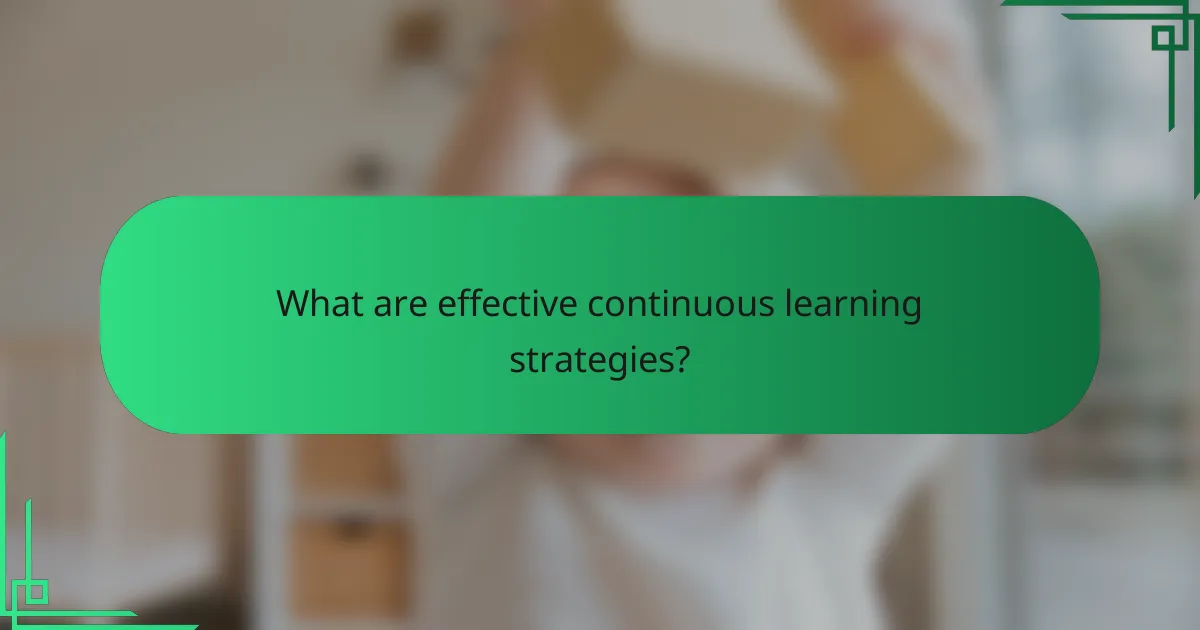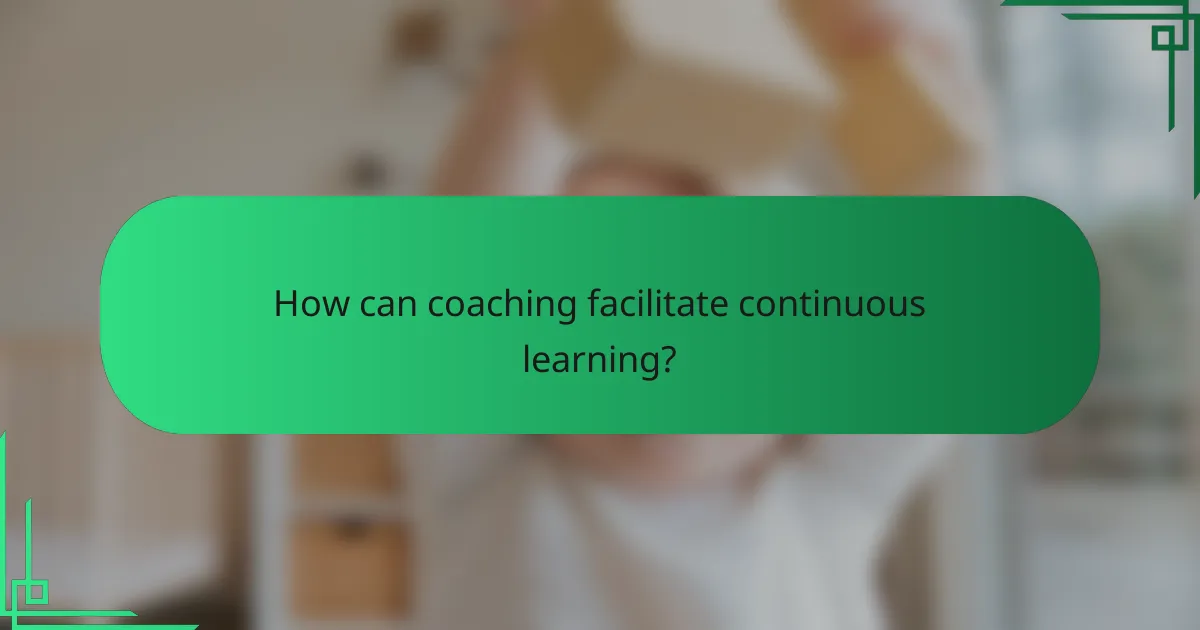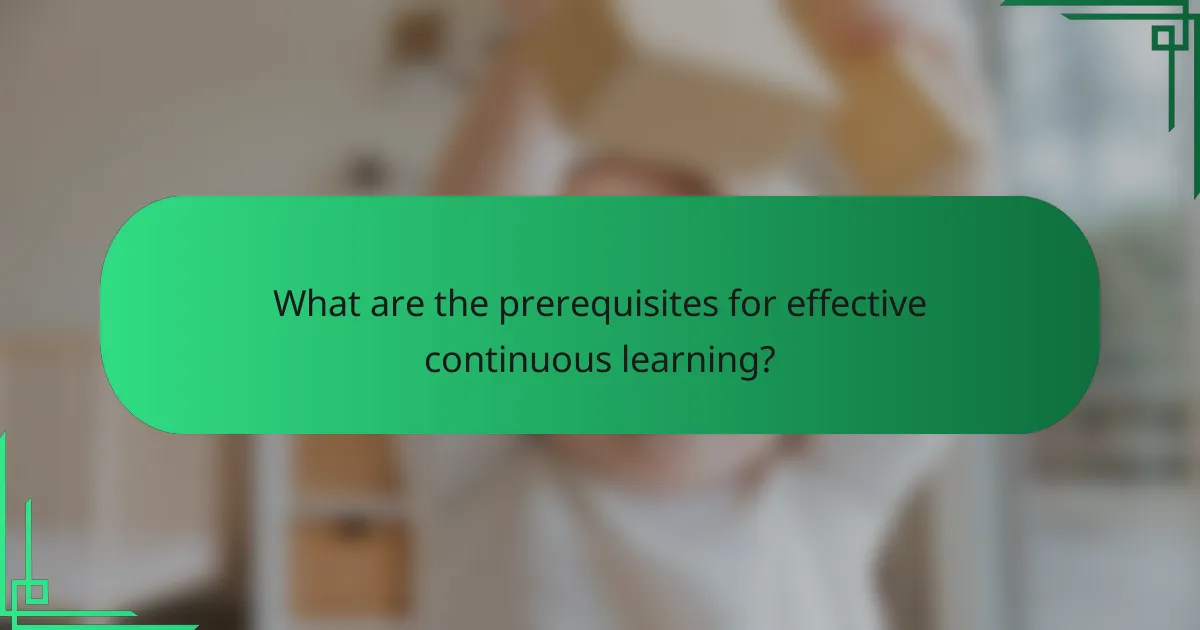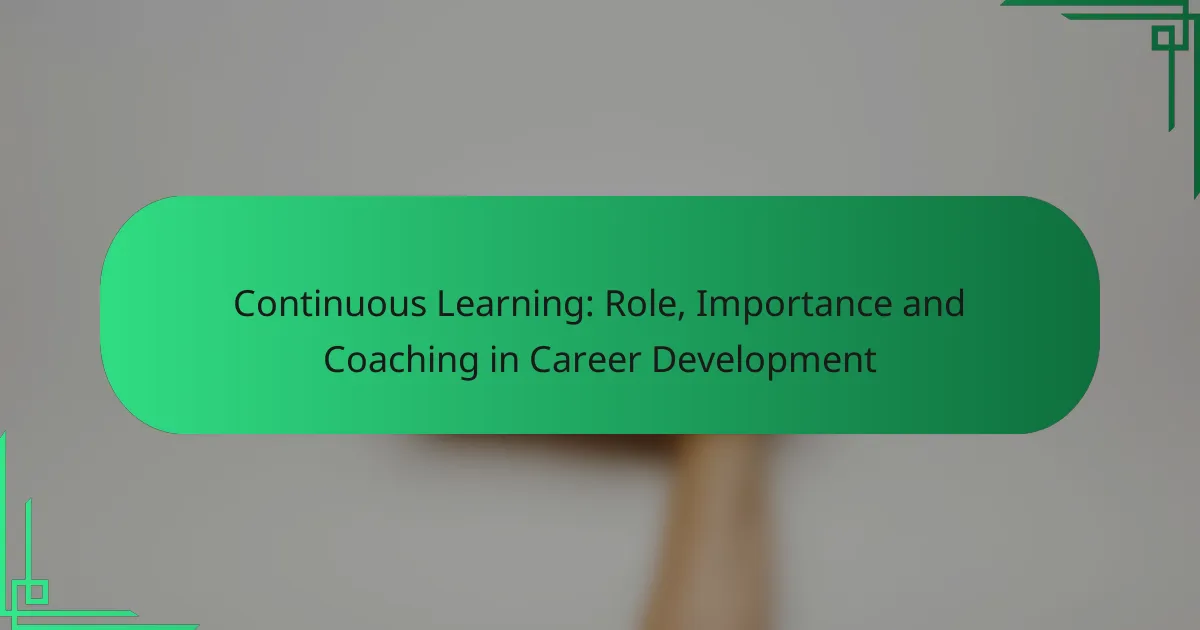Continuous learning is essential for career development, as it enhances skills and knowledge necessary for professional growth. By adapting to evolving job requirements, individuals can maintain their competitiveness in the workforce. Coaching further supports this journey by offering personalized strategies and guidance, helping individuals identify learning opportunities and advance their careers effectively.

How does continuous learning impact career development?
Continuous learning significantly influences career development by enhancing skills and knowledge that are crucial for professional growth. It enables individuals to adapt to changing job requirements and stay competitive in their fields.
Enhances skill adaptability
Continuous learning fosters skill adaptability by encouraging professionals to acquire new competencies and update existing ones. This adaptability is essential in rapidly evolving industries, where technology and methodologies frequently change.
For example, a software developer who regularly learns new programming languages or frameworks can easily transition between projects and meet diverse client needs. This flexibility not only improves job performance but also makes the individual more valuable to employers.
Increases job satisfaction
Engaging in continuous learning can lead to higher job satisfaction as it empowers employees to take ownership of their professional development. When individuals feel that they are growing and improving, they are more likely to enjoy their work and remain motivated.
Participating in training programs or workshops can also create a sense of accomplishment. For instance, completing a certification can boost confidence and provide a clearer career path, enhancing overall job satisfaction.
Boosts career advancement opportunities
Continuous learning is a key factor in boosting career advancement opportunities. Employers often look for candidates who demonstrate a commitment to personal and professional growth, making ongoing education a valuable asset.
Individuals who actively pursue learning opportunities, such as attending industry conferences or enrolling in relevant courses, are more likely to be considered for promotions or leadership roles. This proactive approach can significantly enhance one’s career trajectory.

What are effective continuous learning strategies?
Effective continuous learning strategies include leveraging online courses, attending workshops, and engaging in mentorship programs. These approaches help individuals enhance their skills and adapt to changing job markets.
Online courses through platforms like Coursera
Online courses from platforms like Coursera offer flexibility and a wide range of subjects, allowing learners to study at their own pace. Many courses are designed by universities and industry experts, providing high-quality content that can be accessed globally.
When choosing a course, consider your career goals and the skills you wish to develop. Look for courses that offer certifications, as these can enhance your resume and demonstrate your commitment to learning.
Workshops and seminars in major cities
Workshops and seminars held in major cities provide hands-on learning experiences and networking opportunities. These events often feature industry leaders who share insights and best practices, making them valuable for professional growth.
To maximize the benefits, select workshops that align with your career objectives and allow for interaction with peers. Consider attending events that offer follow-up resources or community support to continue your learning journey.
Mentorship programs with industry leaders
Mentorship programs connect individuals with experienced professionals who can provide guidance and support. These relationships can help you gain insights into your industry, develop new skills, and navigate career challenges.
When seeking a mentor, look for someone whose career path aligns with your aspirations. Establish clear goals for the mentorship and be proactive in seeking advice and feedback to make the most of the experience.

How can coaching facilitate continuous learning?
Coaching plays a vital role in facilitating continuous learning by providing structured support and personalized strategies for professional growth. Through targeted guidance, coaches help individuals identify learning opportunities and develop the skills necessary to advance their careers.
Personalized feedback and guidance
Coaches offer personalized feedback that is tailored to an individual’s specific strengths and weaknesses. This feedback helps learners understand their progress and areas needing improvement, making the learning process more effective. For example, a coach might observe a presentation and provide constructive criticism on delivery and content, allowing the individual to refine their skills.
Additionally, ongoing guidance from a coach can help individuals navigate challenges and stay focused on their learning objectives. This support fosters a growth mindset, encouraging learners to embrace challenges as opportunities for development.
Goal-setting and accountability
Effective coaching involves setting clear, achievable goals that align with an individual’s career aspirations. Coaches assist in defining these goals, ensuring they are specific, measurable, attainable, relevant, and time-bound (SMART). This structured approach helps learners stay motivated and focused on their continuous learning journey.
Accountability is another key aspect of coaching. Regular check-ins with a coach can help individuals track their progress and stay committed to their goals. This accountability can significantly enhance motivation and drive, making it less likely for learners to stray from their development path.
Skill assessment and development
Coaching facilitates skill assessment by identifying current competencies and gaps in knowledge. Coaches can use various tools and techniques, such as self-assessments or 360-degree feedback, to evaluate an individual’s skills comprehensively. This assessment informs the development plan and helps prioritize learning activities.
Once skills are assessed, coaches guide learners in developing those skills through targeted exercises, resources, and practice opportunities. For instance, a coach might recommend specific online courses or workshops to build technical skills relevant to the individual’s career goals. This targeted approach ensures that learning efforts are aligned with professional development needs.

What role do organizations play in promoting continuous learning?
Organizations play a crucial role in promoting continuous learning by providing resources, support, and an environment that encourages skill development. By investing in employee growth, companies can enhance overall performance and adapt to changing market demands.
Providing training budgets
Allocating training budgets is essential for organizations to facilitate continuous learning. These budgets can cover various learning opportunities, such as workshops, online courses, or certifications. A typical training budget might range from 1% to 3% of an employee’s salary, depending on the industry and company size.
Organizations should prioritize training that aligns with both employee interests and business goals. Regularly reviewing and adjusting the budget based on employee feedback and changing needs can maximize the effectiveness of these investments.
Creating a culture of learning
Establishing a culture of learning involves fostering an environment where employees feel encouraged to pursue knowledge and share insights. This can be achieved through recognition programs, mentorship opportunities, and open communication about learning goals. When employees see that learning is valued, they are more likely to engage in continuous development.
To support this culture, organizations should lead by example, with leadership actively participating in learning initiatives. Regularly scheduled knowledge-sharing sessions or lunch-and-learn events can also reinforce the importance of ongoing education.
Offering flexible work arrangements
Flexible work arrangements can significantly enhance opportunities for continuous learning by allowing employees to balance their professional and personal development. Options such as remote work, flexible hours, or compressed workweeks enable individuals to pursue learning at their own pace.
Organizations should consider implementing policies that support flexibility, such as dedicated time for learning during work hours or access to online resources. This approach not only promotes skill enhancement but also improves employee satisfaction and retention.

What are the prerequisites for effective continuous learning?
Effective continuous learning requires a strong commitment to personal growth and access to relevant resources and tools. These prerequisites ensure that individuals can actively engage in their learning journey and apply new knowledge effectively in their careers.
Commitment to personal growth
A commitment to personal growth is essential for continuous learning. This involves setting clear goals, being open to feedback, and actively seeking opportunities for self-improvement. Individuals should regularly assess their skills and identify areas for development.
To foster this commitment, create a personal development plan that outlines specific learning objectives and timelines. This plan can help maintain focus and motivation, making it easier to track progress and celebrate achievements.
Access to resources and tools
Access to resources and tools is crucial for effective continuous learning. This includes educational materials, online courses, workshops, and mentorship opportunities. Utilizing a variety of resources can enhance the learning experience and provide different perspectives on a subject.
Consider leveraging platforms like Coursera or LinkedIn Learning for online courses, and explore local community colleges or professional organizations for workshops. Additionally, networking with industry professionals can provide insights and access to valuable resources that support ongoing education.

How to choose the right continuous learning opportunities?
Choosing the right continuous learning opportunities involves aligning them with your career aspirations and assessing their credibility. Focus on courses or programs that enhance your skills relevant to your field while ensuring they are recognized and respected in the industry.
Aligning with career goals
To effectively align continuous learning with your career goals, start by identifying your long-term objectives. Consider what skills or knowledge gaps you need to fill to advance in your current role or transition to a new one.
For example, if you aim to move into a managerial position, seek courses in leadership or project management. Regularly revisiting your career goals will help you stay focused on relevant learning opportunities.
Evaluating course credibility and reviews
When evaluating the credibility of a course, check for accreditation and the reputation of the institution offering it. Look for programs that are recognized by industry leaders or professional organizations.
Additionally, read reviews and testimonials from previous participants. Platforms like LinkedIn and course-specific forums can provide insights into the effectiveness of the course and its impact on career advancement.
